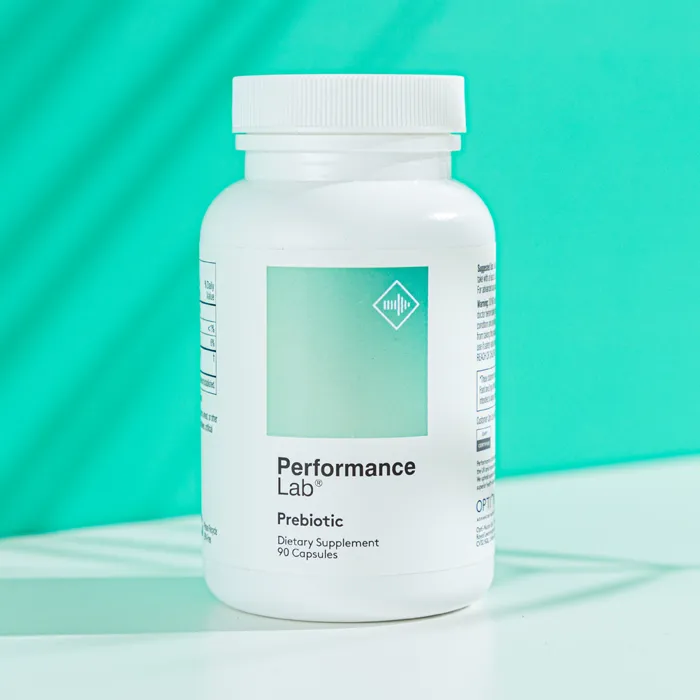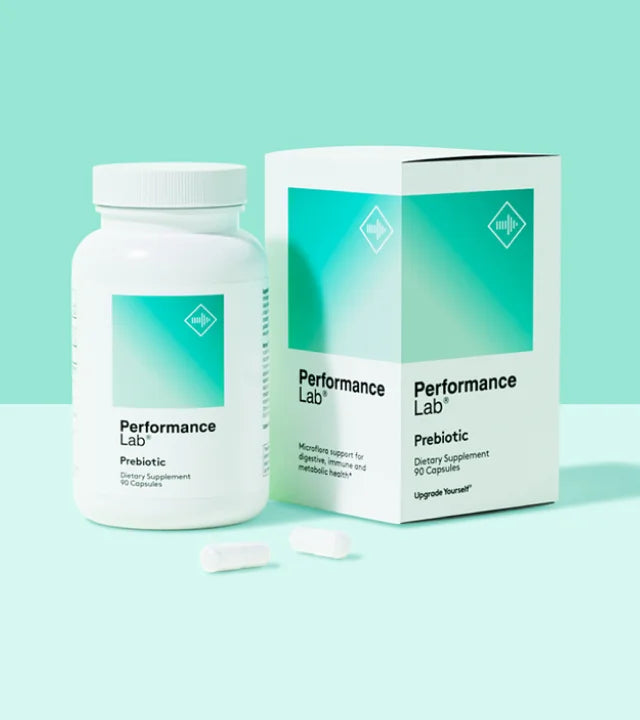You may be surprised to learn that your gut health can impact more than just your digestion. It can affect your entire body, from your brain to your heart and more. Which is why it's so crucial to support your gut with healthy fiber and prebiotics.
This article will explain what fiber and prebiotics are, examine why they're so important, plus look at the best foods to boost both. And if you're considering supplementing, we'll recommend the best prebiotic supplement for you.
Before we dive in, let's first make sure we know just how important a healthy gut can be...
Key Takeaways
- Gut health affects more than digestion — it influences your brain, heart, and immune system too.
- A balanced gut microbiota supports digestion, nutrient absorption, energy, and overall well-being.
- An unhealthy gut may lead to digestive issues, inflammation, fatigue, or poor immune function.
- Diet and lifestyle habits — like poor sleep, high stress, or processed foods — can damage gut balance.
- Eating fiber and prebiotic-rich foods helps nourish beneficial gut bacteria.
- Not all fiber is prebiotic, but prebiotics act as “fuel” for good gut microbes.
- Performance Lab Prebiotic, made with inulin-FOS from chicory root, is a gentle, clinically supported way to boost gut health.

The Health Benefits of a Healthy Gut Microbiota

I'm going to mention the words 'gut microbiota' and 'gut microbiome' several times in this article, so let me first explain what I mean by that and examine why it's so important.
Our gut microbiome plays host to more than one hundred trillion microorganisms such as bacteria, fungi and viruses that live in a microscopic world inside our gastrointestinal tract (GI) tract. These microorganisms are known as our microbiota.
This is where the 'good' and 'bad' bacteria you've probably heard so much about live. We're constantly adding to this microbiota with the foods we eat.
Gut Bacteria: Balance Needed
The balance of the microbiota in your gut is crucial. An excess of bad bacteria, for example (known as dysbiosis), can cause gastrointestinal issues and has been associated with chronic diseases such as inflammatory bowel disease, irritable bowel syndrome, obesity and more. (1)
When in balance and operating optimally, our gut helps to break down and absorb food, influence energy levels, help with nutrient absorption, synthesize vitamins and create compounds such as short chain fatty acids that may help to support our digestive health.
And it doesn't stop there...
Influence on Immune System, Cardiovascular Disease, Digestive Health and More!
Did you know?
-
The human gut communicates with various systems and organs throughout the body via what is known as the gut-organ axis. (2)
-
Gut-Brain Axis: The two-way communication between the gut and the brain, for example, may influence your mood, mental state and emotional regulation. (3)
-
Gut-Heart Axis: The short chain fatty acids released by the gut may influence heart health, protecting against conditions such as hypertension and coronary artery disease. (4)
-
Gut-Immune Axis: 70% of our immune cells are in our gut, suggesting a healthy gut with diverse microbes is needed to support our immune system. (5, 6)
And that's just the tip of the iceberg! Or just a brief taste of how the gut microbiota can influence host health.
Potential Causes of Poor Gut Health
As you can see, the diverse nature of our microbiota is super important to our overall health, but it's also fragile. Several aspects of modern-day life ranging from diet and sleep to stress and lifestyle can damage the delicate balance of the microbiome. They include:
-
Sleep deprivation
-
A diet high in processed carbs and sugars
-
A sedentary lifestyle
-
High stress
-
Medications, such as the use of antibiotics.
These combine with other influences that we can't alter such as genetics, age, method of delivery at birth (vaginal or c-section delivery), early infant feeding, and any infections to influence our microbiome. (7)
Symptoms of Poor Gut Health

How do you know if your gut health is damaged or poor? The following are some of the common signs of an unhealthy gut microbiota...
-
Gas, bloating, constipation, diarrhea, irregular bowel movements, or other digestive issues.
-
Stomach pains or cramps.
-
Inflammation.
-
Sleep disturbances.
-
Fatigue, especially after eating.
-
Cravings for processed foods or sugar.
-
Skin issues, caused by issues with nutrient absorption.
The good news is that there are steps that you can take to strengthen and improve the balance of your gut microbiota.
As well as addressing the causes of imbalance mentioned above, you can also help to increase the beneficial bacteria in your gut by adjusting your diet. Specifically, opting for a high fiber diet rich in prebiotics. There are also supplements like Performance Lab Prebiotic that may help.
So let's look at both dietary fiber and prebiotics to ascertain how they may help...
What is Dietary Fiber?

Dietary fiber is a type of carbohydrate found in plants, made up of many sugar molecules linked together that the human body cannot digest.
There are two main types:
-
Soluble fiber which dissolves in water and becomes gel-like. This may interfere with the absorption of fats and cholesterol, potentially helping to lower LDL or bad cholesterol. It may also slow the absorption of carbohydrates, which may help to control blood glucose.
-
Insoluble fiber that travels mostly intact through the stomach, small intestine, and colon. This may help to bulk up stools, making it easier for food and waste to pass through your system. (8)
Clinical trials have studied dietary fiber for its association with a healthy gut microbiota, metabolic health, favorable body weight, as well as a potentially reduced risk of cardiovascular disease. (9)
Food and Drug Administration Warning
According to the FDA, most Americans do not get enough fiber in their diet. The recommended daily value is 28 grams per day of fiber based on a 2,000 calorie diet. (10)
Recommended Sources of Dietary Fiber
According to the Dietary Guidelines for Americans, you should ideally consume a variety of fruits, vegetables, grains and beans to gain enough fiber in your diet. Half of those grains should be whole grains, and you should limit your intake of refined grains.
Good Sources of Fiber
Vegetables, beans, lentils, peas, fruits, nuts, seeds and whole grains such as brown rice, quinoa, couscous, bulgur, brown bread, whole wheat, cereals and pasta.
Are All Fibers Prebiotics?
No, while most prebiotics are a type of fiber, it doesn't work the other way around. Not all fibers are prebiotics. To be considered an official prebiotic fibre, it must pass through the GI tract intact without being digested, and be fermented by gut microflora.
What are Prebiotics?

Prebiotics are food for the 'good' or 'friendly' bacteria in your gut microbiome, helping them to thrive. Humans are unable to digest prebiotics, but certain useful microbes can. These good bacteria fervent the prebiotics in the large intestine, and release short chain fatty acids (SCFAs)as a result.
These SCFAs are beneficial in many ways, including helping to maintain the gut's barrier to prevent infection from the gut to the rest of the body.
If it helps, think of prebiotics like fertilizer. We use fertilizer to encourage plants to grow. In a similar fashion, we can use prebiotics to help beneficial bacteria thrive - which in turn helps to maintain a balanced gut microbiota. (11)
Examples of prebiotics
Examples of prebiotics include Inulin, FOS (fructooligosaccharides), beta glucans, resistant starch, pectin, and galacto oligosaccharides.
Foods Rich in Prebiotics
Jerusalem artichokes, garlic, onions, and whole grains are rich in prebiotics, including inulin and FOS, while fruits, such as bananas and apples, are good sources of pectin and fructo-oligosaccharides.
Legumes, such as beans and lentils, are rich in prebiotics and fiber. Other sources of prebiotics can include flax, soy, cabbage, peas, eggplant, asparagus, beans, and chicory.
Some processed foods have prebiotics added, such as cereals, snack foods, and bread. You may see Inulin, acacia gum, GOS (galactooligosaccharides), FOS (fructooligosaccharides) and TOS (transgalactooligosaccharides) on labels. (12)
It's recommended that you try to eat a variety of natural and fortified prebiotic foods, but there's also a supplemental option - a quality prebiotic supplement such as Performance Lab Prebiotic.
A Quick Word about Probiotics and Prebiotics
Prebiotics vs Probiotics: What's the difference?
You may think probiotics and prebiotics are the same - but you would be wrong.
-
Prebiotics are the fertilizer and food for the bacteria in our gut (which can be beneficial probiotics).
-
Probiotics are live microorganisms such as bacteria (usually found in fermented foods and supplements) that may provide health benefits of their own. (13)
Best Prebiotic Fiber Supplement
Performance Lab Prebiotic includes Inulin-FOS, two soluble fibers with prebiotic properties, made from chicory root.
Inulin-FOS is undigested fiber that arrives intact in the colon. Once there, it feeds Bifidobacterium 'good' probiotic strains, encouraging their growth. It has been shown to increase Bifidobacteria distribution in the gut from 20% to 71%.
Performance Lab Prebiotic includes a gentle 2g of prebiotic fibre taken over three capsules. This allows you to start with a low dose and build up to your own personal tolerance.
If you want to supplement, this is a great choice.
I’ve improved my gut health exponentially. Can’t recommend them enough.Josh S

A Warning about Supplements
Many supplements boast ten or more new probiotic strains or billions of 'live' cultures.
They sound great, but closer inspection either reveals many of these are dead on arrival, can be destroyed by stomach acids or can cause discomfort for the gut. That's why Performance Lab Prebiotic includes studied prebiotic fibers that pass undigested into the colon.
Final Thoughts
A healthy gut microbiome is essential for overall health and well-being, supporting immune function, digestion, and even mental health, as well as helping to manage weight . You can maintain that by following a high fiber diet rich in prebiotics that promotes the growth of beneficial gut bacteria.
A diet rich in whole grains, fruits, and vegetables can provide fiber and prebiotics to support digestive health, with potential knock on benefits to overall health and well-being.
A supplemental option like Performance Lab Prebiotic may help further.
References
- Zhang, Y. J., Li, S., Gan, R. Y., Zhou, T., Xu, D. P., & Li, H. B. (2015). Impacts of gut bacteria on human health and diseases. International Journal of Molecular Sciences, 16(4), 7493–7519. https://doi.org/10.3390/ijms16047493
- Saxami, G., Kerezoudi, E. N., Eliopoulos, C., Arapoglou, D., & Kyriacou, A. (2023). The Gut-Organ Axis within the Human Body: Gut Dysbiosis and the Role of Prebiotics. Life (Basel, Switzerland), 13(10), 2023. https://doi.org/10.3390/life13102023
- Appleton, J. (2018). The Gut-Brain Axis: Influence of Microbiota on Mood and Mental Health. Integrative Medicine (Encinitas, Calif.), 17(4), 28–32.
- Zhang, Y., Wu, H., Jin, M., Feng, G., & Wang, S. (2025). The gut-heart axis: unveiling the roles of gut microbiota in cardiovascular diseases. Frontiers in Cardiovascular Medicine, 12.
- UCLA Health. If you want to boost immunity, look to the gut. https://www.uclahealth.org/news/article/want-to-boost-immunity-look-to-the-gut
- Cleveland Clinic. Gut Microbiome. https://my.clevelandclinic.org/health/body/25201-gut-microbiome
- Wen, L., & Duffy, A. (2017). Factors Influencing the Gut Microbiota, Inflammation, and Type 2 Diabetes. The Journal of Nutrition, 147(7), 1468S–1475S. https://doi.org/10.3945/jn.116.240754
- Holscher, H. D. (2017). Dietary fiber and prebiotics and the gastrointestinal microbiota. Gut Microbes, 8(2), 172–184.
- Barber, T. M., Kabisch, S., Pfeiffer, A. F. H., & Weickert, M. O. (2020). The Health Benefits of Dietary Fibre. Nutrients, 12(10), 3209. https://doi.org/10.3390/nu12103209
- Interactive Nutrition Facts Label - Dietary Fiber. FDA. https://www.accessdata.fda.gov/scripts/interactivenutritionfactslabel/assets/InteractiveNFL_DietaryFiber_October2021.pdf
- Understanding Prebiotics and Fiber. International Scientific Association for Probiotics and Prebiotics. https://isappscience.org/infographic-fiber-prebiotics
- Food as Medicine: Prebiotic Foods. Children's Hospital of Philadelphia. https://www.chop.edu/health-resources/food-medicine-prebiotic-foods
- Prebiotics and probiotics. GutsUK. https://gutscharity.org.uk/advice-and-information/health-and-lifestyle/prebiotics-probiotics/















